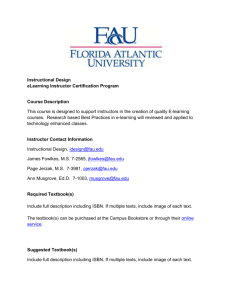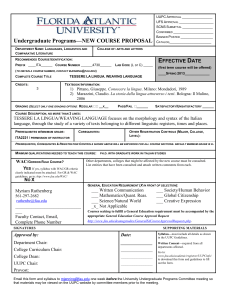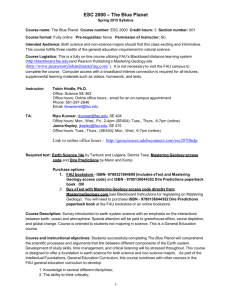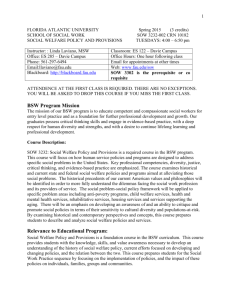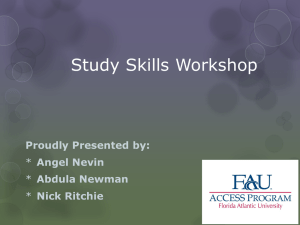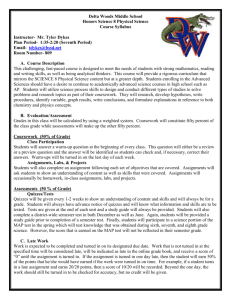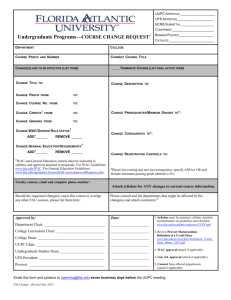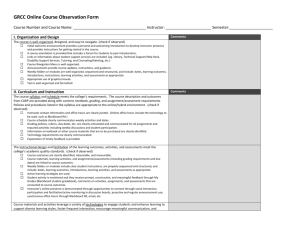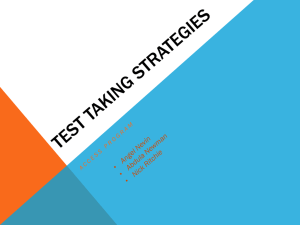Standards for writing the Accreditation Report
advertisement
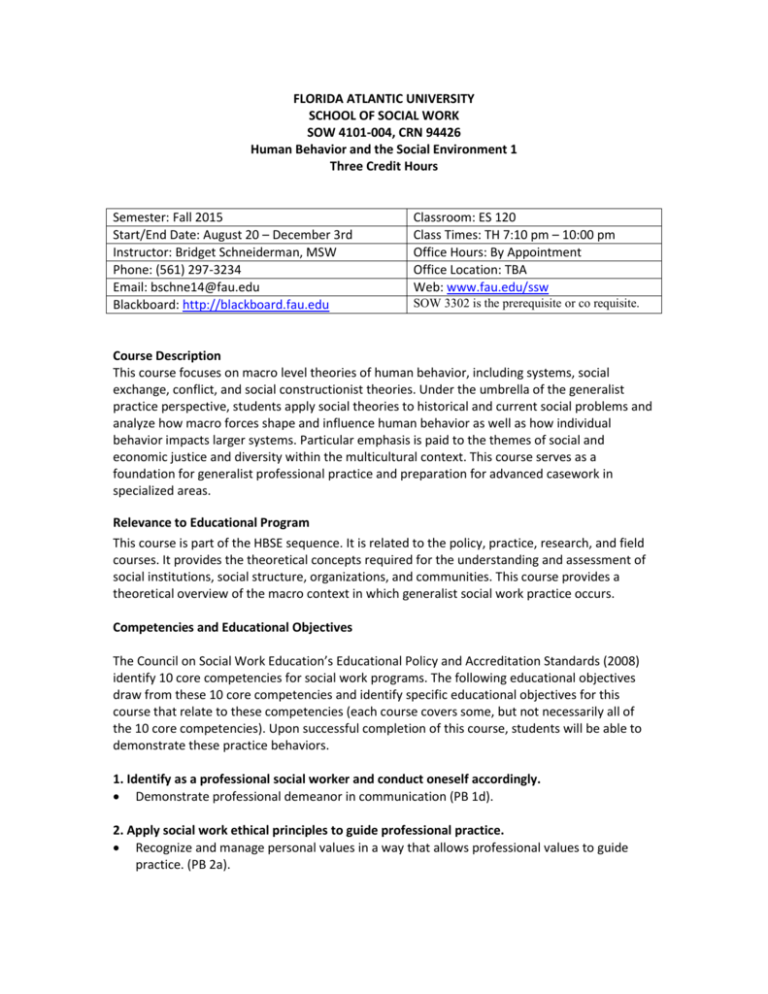
FLORIDA ATLANTIC UNIVERSITY SCHOOL OF SOCIAL WORK SOW 4101-004, CRN 94426 Human Behavior and the Social Environment 1 Three Credit Hours Semester: Fall 2015 Start/End Date: August 20 – December 3rd Instructor: Bridget Schneiderman, MSW Phone: (561) 297-3234 Email: bschne14@fau.edu Blackboard: http://blackboard.fau.edu Classroom: ES 120 Class Times: TH 7:10 pm – 10:00 pm Office Hours: By Appointment Office Location: TBA Web: www.fau.edu/ssw SOW 3302 is the prerequisite or co requisite. Course Description This course focuses on macro level theories of human behavior, including systems, social exchange, conflict, and social constructionist theories. Under the umbrella of the generalist practice perspective, students apply social theories to historical and current social problems and analyze how macro forces shape and influence human behavior as well as how individual behavior impacts larger systems. Particular emphasis is paid to the themes of social and economic justice and diversity within the multicultural context. This course serves as a foundation for generalist professional practice and preparation for advanced casework in specialized areas. Relevance to Educational Program This course is part of the HBSE sequence. It is related to the policy, practice, research, and field courses. It provides the theoretical concepts required for the understanding and assessment of social institutions, social structure, organizations, and communities. This course provides a theoretical overview of the macro context in which generalist social work practice occurs. Competencies and Educational Objectives The Council on Social Work Education’s Educational Policy and Accreditation Standards (2008) identify 10 core competencies for social work programs. The following educational objectives draw from these 10 core competencies and identify specific educational objectives for this course that relate to these competencies (each course covers some, but not necessarily all of the 10 core competencies). Upon successful completion of this course, students will be able to demonstrate these practice behaviors. 1. Identify as a professional social worker and conduct oneself accordingly. Demonstrate professional demeanor in communication (PB 1d). 2. Apply social work ethical principles to guide professional practice. Recognize and manage personal values in a way that allows professional values to guide practice. (PB 2a). Make ethical decisions by applying the NASW Code of Ethics, and as applicable, the IFSW/IASSW Ethics in Social Work, Statement of Principles (with particular emphasis on social and economic justice) (PB 2b). Tolerate ambiguity in resolving ethical conflicts related to social institutions (PB 2c). 3. Apply critical thinking to inform and communicate professional judgments. Distinguish, appraise, and integrate multiple sources of knowledge, including researchbased knowledge and practice wisdom (PB 3a). Critically analyze models of assessment and prevention in the context of social institutions and well being (PB 3b). Demonstrate effective oral and written communication in working with colleagues (PB 3c). 4. Engage diversity and difference in practice. Recognize the extent to which a culture’s structures and values may oppress, marginalize, alienate, or create or enhance privilege and power (PB 4a). Recognize and communicate their understanding of the importance of difference in shaping life experiences (PB 4c). 5. Advance human rights and social and economic justice. Understand the forms and mechanisms of oppression (PB 5a). Advocate for human rights and social and economic justice (PB 5b). Engage in practices that advance social and economic justice (PB 5c). 7. Apply knowledge of human behavior and the social environment. Utilize conceptual frameworks to guide the processes of assessment and evaluation of human behavior and the social environment (PB 7a). Critique and apply knowledge to understand person and environment (PB 7b). 9. Respond to contexts that shape practice. Continuously discover, appraise, and attend to changing locales, populations, scientific and technological developments, and emerging societal trends to provide relevant services, including issues related to poverty, health, education, and criminal justice disparities (PB 9a). 10. Engage, assess, intervene, and evaluate with individuals, families, groups, organizations, and communities. Assessment: Collect, organize, and interpret client data on a macro level (e.g., populations at risk) (PB 10d). Teaching Methodologies Teaching methods include lecture, group discussions, readings, videos, writing assignments, quizzes, and exams. 2 Course Assignments and Grading The BSW program expects each student to exhibit a certain level of mastery as concerns written communications. It also expects each student to constantly seek to improve his or her skills in the interest of professionalism. Accordingly, all written assignments should be turned in with an absolute minimum of errors in spelling, grammar, syntax, etc. While this is not an English class, the overall readability of a paper affects how that paper will be understood and graded. For those who need help with writing skills, the university does offer assistance; review http://www.library.fau.edu/npb/respaper.htm for writing and research tips or visit the Writing Center at LA 240 F on Davie Campus (954) 236-1111. All written work should be typed or word-processed in APA format. Use a dictionary or “spell check” to ensure against error. As social work practice involves the extensive use of writing skills, this strictness on the instructor’s part is another way to ensure students will be able to present their views in a professional manner. Grading Criteria Exam I Exam II Film Paper Community Project Readings Quizzes Attendance and Participation Total 20% of total grade 20% of total grade 10% of total grade 20% of total grade 5% of total grade 15% of total grade 10% of total grade 100% The grading scale for this course is as follows: 93 – 100% = A 90 – 92% = A87 – 89% = B+ 83 – 86% = B 80 – 82% = B77 – 79% = C+ 73 – 76% = C 70 – 72% = C67 – 69% = D+ 63 – 66% = D 60 – 62% = D0 – 59% = F Exams Two exams will be administered during the semester. Exam material will be based on information from the text, supplemental readings, lectures, handouts, and guest presenters and/or videos, if applicable. Exams will have both objective and subjective questions. Exams will be posted on Blackboard on starting at 7:10 pm on the date listed. Exams must be completed by 10:00 pm on that same date, students will only be given one chance to take the exam. [PBs 2c, 3a, 3b, 4a, 4c, 5a, 7a, 7b, 9a, 10d] 3 Film Students will review the film Park Avenue: Money, Power and the American Dream in class. Students will take a quiz on Blackboard consisting of fill in the blank responses reflecting the film. [PBs 1d, 2a, 2b, 2c, 3a, 3b, 3c, 4a, 4c, 5a, 5b, 5c, 7a, 7b, 9a, 10d] Community Project Students will attend either one community event or participate in a volunteer experience that correlates to one topic discussed in class. Students will submit a signed record (by person facilitating event) of having attended event with a description of it. [1d, 2a, 2c, 3a, 3c, 4a, 4c, 5a, 7a, 7b, 9a, 10d] Paper Students will submit a paper discussing how a particular social status group is oppressed. They will research the topic in the context of the position that oppression is rooted in social group privilege and maintained by unequal power relations that should be challenged. They must incorporate relevant content from the text as well as research from academic websites and professional journal articles. Students must submit both a hard copy and electronic copy (through SafeAssign). APA format and writing standards are required. Detailed instructions for the paper, including criteria for grading, will be discussed in class and posted on Blackboard. [PBs 1d, 2a, 2b, 3a, 3c, 4a, 4c, 5a, 5b, 5c, 7a, 7b, 9a, 10d] Readings Quizzes Students are expected to follow the reading schedule as outlined in the course schedule. This will enhance the learning process. Pop reading quizzes will be given three times throughout the semester. Questions will consist of the chapter(s) being lectured on that day as listed in the syllabus. Quizzes will be given at the beginning of class; students must be on time to take it. There will be no make-up quizzes. Students will be able to drop their lowest quiz grade. [1d, 2a, 2c, 3a, 3c, 4a, 4c, 5a, 7a, 7b, 9a, 10d] Attendance and Participation Note: As per FAU SSW Policy, failure to attend the first class will result in the student’s automatic withdrawal from the course. Social work education is designed to help students prepare for professional practice. In order to model ethically appropriate practice, please treat coming to class as you would treat working at an agency. Given the Council on Social Work Education’s requirements for professional behavior, attendance for all classes is required. More than one unexcused absence, excessive tardiness, or patterns of leaving early will result in a reduction of 30% of attendance grade. Tardiness and or leaving early will be considered excessive after one time. Students will be asked to present a written excuse from a healthcare provider for excused absences due to illness or other appropriate documentation for other circumstances. If documentation does not 4 demonstrate why student was absent during that time, absence will not be excused. Absences will not be considered excused without supporting documentation. Since participating in class is an integral part of social work education, it is vital that the student be in class; therefore, even with excused absences, the student may be required to withdraw or retake the class. If a student misses more than 2 classes – whether or not this is a documented, excused absence – will receive a 0% for attendance and participation grade. Texting and use of additional electronic devices in class is prohibited as this distracts from participating in class. Makeup Assignments, Late Work, and Incompletes There will be five points deducted per day for late assignments not submitted via email if class is not meeting, and in person during class. If the assignment is not completed by the following class period, it will result in a failing grade. Quizzes, tests, video assignment, and the community project may not be submitted late. If a student needs to miss an assignment due to a documented illness or other documented emergency, the student shall notify the instructor as soon as practically possible, and the instructor may arrange for a makeup assignment. If student does not produce appropriate documentation, or immediately when able to contact the instructor, the student will not be allowed to make-up assignment. A student may request an excused absence for religious observance but the student is responsible for completing any assignments on time, and must notify the instructor beforehand. Also, note that grades of Incomplete (“I”) are reserved for students who are passing a course but have not completed all the required work because of exceptional documented circumstances that are outside of the student’s control. A student who does not complete the work by a date as agreed by the instructor will receive an F for each incomplete assignment. Professional Expectations of Student Behavior The Florida Atlantic University School of Social Work is mandated by the Council on Social Work Education (CSWE) to foster and evaluate professional behavioral development for all students in the social work program. The School of Social Work also bears a responsibility to the community at large to produce fully trained professional social workers who consciously exhibit the knowledge, values, and skills of the profession of social work. The values of the profession are codified in the NASW Code of Ethics. Given this context, all students in the social work program will be expected to exhibit the following ethical standards of behavior. 1. Accountability: Attend class, arrive on time, and return from break in a timely manner. Participate in group activities and assignments at a comparable level to peers. Complete work in a timely fashion and according to directions provided. Come to class prepared, with readings and other homework completed. 2. Respect: Treat all your peers, your instructors and all those you come in contact with, with dignity and respect at all times. Listen while others are speaking. Give feedback to peers in a constructive manner. Approach conflict with peers or instructors in a cooperative manner. 5 Use positive and nonjudgmental language. 3. Confidentiality: Treat any personal information that you hear about a peer or an instructor as strictly confidential. Maintain any information shared in class, dyads or smaller groups within that unit. Use judgment in self-disclosing information of a very personal nature in the classroom. Class time should not be used as therapy or treatment. If students feel the need to talk about issues they are struggling with, they may consult with their instructor to receive a referral for counseling. Never use names of clients or disclose other identifying information in the classroom. 4. Competence: Apply yourself to all your academic pursuits with seriousness and conscientiousness, meeting all deadlines as given by your instructors. Constantly strive to improve your abilities. Come to class with books, handouts, syllabus, and pens. Seek out appropriate support when having difficulties to ensure success in completing course requirements. Take responsibility for the quality of completed tests and assignment. Strive to work toward greater awareness of personal issues that may impede your effectiveness with clients. 5. Integrity: Practice honesty with yourself, your peers, and your instructors. Constantly strive to improve your abilities. Academic: Commit yourself to learning the rules of citing other’s work properly. Do your own work and take credit only for your own work. Acknowledge areas where improvement is needed. Accept and benefit from constructive feedback. Submission of Papers: Students will submit their written assignments on paper and electronically. Electronic copies will be subject to plagiarism analysis and will be kept in electronic file for future reference. A student may not submit the same paper, or essentially the same, paper, project, assignment, or finished project to an instructor, which has been submitted to another instructor, unless specifically authorized by both instructors to do so. 6. Diversity: Strive to become more open to people, ideas, and creeds that you are not familiar with. Embrace diversity. Maintain speech free of racism, sexism, ableism, heterosexism, or stereotyping. Exhibit a willingness to serve diverse groups of persons. Demonstrate an understanding of how values and culture interact. 7. Communication: Strive to improve both verbal and written communication skills as these skills are used heavily in interactions with clients and peers and also with creating client records. 6 Demonstrate assertive communication with peers and instructors. Practice positive, constructive, respectful and professional communications skills with peers and instructor (body language, empathy, listening). 8. Social Justice: Strive to deepen your commitment to social justice for all populations at risk. Demonstrate an understanding of how institutional and personal oppression impede the experience of social justice for individuals and groups. Strive to learn about methods of empowering populations and enhancing social justice at micro, mezzo, and macro levels. Consequences of Unacceptable Behavior The School of Social Work may terminate a student’s participation in the program on the basis of professional non-suitability if the School’s faculty members determine that a student’s behavior has constituted a significant violation or pattern of violations of the NASW Code of Ethics, the FAU School of Social Work Student Manual, or the FAU Academic Policies and Regulations. Examples of violations that may lead to termination include (but are not limited to) the following: 1. Failure to meet or maintain academic grade point requirements as established by the University and the Social Work program. 2. Academic cheating, lying, or plagiarism. 3. Behavior judged to be in violation of the NASW Code of Ethics. 4. Failure to meet generally accepted standards of professional conduct, personal integrity, or emotional stability requisite for professional practice. 5. Inappropriate or disruptive behavior toward colleagues, faculty, or staff (at the School or in the field placement). 6. Consistent failure to demonstrate effective interpersonal skills necessary for forming professional relationships (for example, unable to demonstrate nonjudgmental attitude or unable to allow client self-determination). 7. Documented evidence of criminal activity occurring during the course of study. For additional university-wide policies and regulations see the FAU Catalog at http://www.fau.edu/registrar/universitycatalog/welcome.php. This web site contains information on grading, incomplete grades, cheating on exams, plagiarism, expectations of student behavior, and communications devices (e.g., cell phones to be disabled during class sessions). Policy on Use of Recording Devices in the Classroom The School of Social Work prohibits the use of computers, audio recording, or video recording of instructional activities in classrooms, laboratories, and studios without the expressed written consent of the instructor. This does not apply to students receiving services from the Office with Student Disabilities. When the instructor's consent is given, the materials are for personal use only and are not for distribution or sale in any fashion. 7 Required Readings: The required books for this course are: Hutchison, E.D. (2010). Dimensions of Human Behavior: Person and Environment (5th ed.) Thousand Oaks, CA: Sage Publications. The textbook recommended for this course is: American Psychological Association (2010). Publication Manual of the American Psychological Association (6th ed.). Washington DC: Author. Students are also required to read online articles on the web sites of selected professors, economists, journalists, and politicians posted on our Blackboard course site. In the event of a hurricane warning, see www.fau.edu or watch for other media announcements for updates on whether there will be a disruption in FAU classes. Class times and assignments will be modified as needed. Bibliography: Bureau of Labor and Statistics. (2012). Charting International Labor Comparisons. Retrieved from http://www.bls.gov/fls/chartbook.htm. Bureau of Labor and Statistics. (2013). The Employment Situation. Retrieved from http://www.bls.gov/news.release/pdf/empsit.pdf. Centers for Disease Control and Prevention. (2010). Births, Marriages, Divorces, and Deaths: Provisional Data 2009. Retrieved from http://www.cdc.gov/nchs/data/nvsr/nvsr58/nvsr58_25.htm. Centers for Disease Control and Prevention. (2011). Childbearing Differences Among Three Generations of U.S. Women. Retrieved from http://www.cdc.gov/nchs/data/databriefs/db68.htm. Ellison, R. (1947). Invisible Man. New York: Vintage International. Gibney, A. (2012, November 12). Park Avenue: Money, Power and the American Dream [film]. Retrieved from http://video.pbs.org/video/2296684923/ Goodman, C.J. & Mance, S.M. (2011, April). Employment Loss and the 2007-2009 Recession: An Overview. Monthly Labor and Review 134(4). Retrieved from http://www.bls.gov/opub/mlr/2011/04/art1full.pdf. Halberstam, D. (1998). The Children. New York: Random House. 8 Herman, J. (1992). Trauma and Recovery: The Aftermath of Violence – from Domestic Abuse to Political Terror. New York: Perseus Books Group. Morrison, T. (1987). Beloved. New York: A Plume Book. Murray, C. (1984). Losing Ground: American Social Policy 1950 - 1980. New York: BasicBooks. Musashi, M. (1993). The Book of Five Rings. Boston: Shambhala Publications, Inc. Olson, L. (2001). Freedom’s Daughter: The Unsung Heroines of the Civil Rights Movement 1830 to 1970. New York: Touchstone. Reich, R. (1998). Locked in the Cabinet. New York: Vintage Books. Robbins, A. (2002). Secrets of the Tomb: Skulls and Bones, The Ivy League, and the Hidden Paths of Power. Boston: Little, Brown and Company. Stiglitz, J. (2012). The price of inequality. New York, NY: Norton. United Nations Development Programme (2013). The Rise of the South: Human Progress in a Diverse World. Retrieved from http://hdr.undp.org/en/media/HDR_2010_EN_Complete_reprint.pdf. United States Department of Justice. (2010). ADA 2010 Revised Requirments Effective Date Compliance Date. Retrieved from http://www.ada.gov/revised_effective_dates2010.htm. United States Department of Justice. (2010). 2010 ADA Standards for Accessible Design. Retrieved from http://www.ada.gov/2010ADAstandards_index.htm. Course Outline and Assignments: Date Class Topics August 20 Course Introduction/Syllabus Review August 27 Lecture – Chapter 1: “Aspects of Human Behavior: Person, Environment, Time” September 3 Lecture – Chapter 2 “Theoretical Perspectives on Human Behavior” September 10 Lecture – Chapter 5: “The Psychosocial Person” 9 Required Readings /Assignments Due Syllabus Chapter 1 Library Orientation Chapter 2 Chapter 5 Review Compassion Fatigue Handout Review Coping with Stress Handout Handouts posted on Blackboard September 17 Lecture – Chapter 8: “Culture” Chapter 8 September 24 Lecture – Chapter 7: “The Physical Environment”/ ADA Chapter 7 Review ADA URL link available on Blackboard. October 1 Exam 1 – Chs. 1,2,5, 8, & 7 any additional material given during class October 8 Lecture - Chapter 9: “Social Institutions and Social Structures”/ European Parliament/ UN – Human Development Report Must be completed on blackboard by 10:00 pm. Chapter 9 Review Human Development Report URL link available on Blackboard. Paper due at 7:10 pm October 15 Lecture – Chapter 12: “Formal Organizations” Chapter 12 October 22 Lecture – Chapter 13: “Communities” Chapter 13 October 29 Lecture – Chapter 11: “Small Groups”/ Irvin Yalom Chapter 11 Review Irvin Yalom November 5 Lecture – Chapter 14: “Social Movements” Chapter 14 November 12 Film –Park Avenue: Money, Power and The American Dream Review Park Avenue: Money, Power, and The American Dream November 19 Community Project Must be completed in the field. Community Project due at 10:00 pm 10 November 26 Thanksgiving Recess No Class December 3 Exam II - Chs. 9,11,12,13,14 and any additional material given during class Must be completed on blackboard by 10:00 pm. SAFEWALK – Night Owls Davie 954-236-1902 Ft. Lauderdale 954-762-5611 Jupiter 561-799-8700 Campus security will escort individuals, day or night. Call ahead or go to their offices at Room 155 in the LA Building, Davie to make appropriate arrangements. Boca Raton 561-297-6695 STUDENTS WITH DISABILITIES In compliance with the Americans with Disabilities Act (ADA), students who require special accommodations due to a disability to properly execute coursework must register with the Office for Students with Disabilities (OSD) located in Boca Raton - SU 133 (561-297-3880), in Davie - MOD I (954-236-1222), in Jupiter - SR 117 (561-799-8585), or at the Treasure Coast - CO 128 (772-873-3305), and follow all OSD procedures. DISCRIMINATION OR HARASSMENT – 561-297-4004 Students who have concerns about on-campus discrimination or harassment (including sexual harassment) can contact the FAU Equal Opportunity Program for assistance. The Boca office is located in Administration Building Room 291. Our full Nondiscrimination Policy is posted on our website at http://www.fau.edu/ssw/public/nondiscrim.html. RELIGIOUS HOLIDAYS This course has been arranged so that there will be no classes on religious holidays, such as Christmas or Yom Kippur. Please advise the instructor at the beginning of the term if you need accommodations for other religious holidays. HONOR CODE Students at Florida Atlantic University are expected to maintain the highest ethical standards. Academic dishonesty, including cheating and plagiarism, is considered a serious breach of these ethical standards, because it interferes with the University mission to provide a high quality education in which no student enjoys an unfair advantage over any other. Academic dishonesty is also destructive of the University community, which is grounded in a system of mutual trust and places high value on personal integrity and individual responsibility. Harsh penalties are associated with academic dishonesty. For more information, see http://www.fau.edu/regulations/chapter4/4.001_Code_of_Academic_Integrity.pdf ADDITIONAL INFORMATION ON STUDENT RIGHTS and RESPONSIBILITIES 11 For additional information on student rights and responsibilities, please see the FAU Catalog at http://www.fau.edu/registrar/universitycatalog/welcome.php and the BSW Student Manual at http://www.fau.edu/ssw/pdf/BSWstudmanual32706.pdf or the MSW Student Manual at http://www.fau.edu/ssw/pdf/MSWstudmanual.pdf. 12
